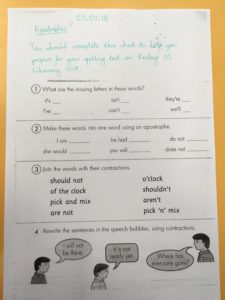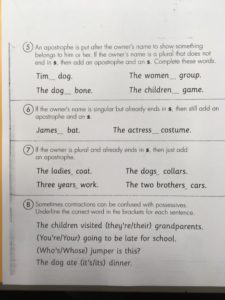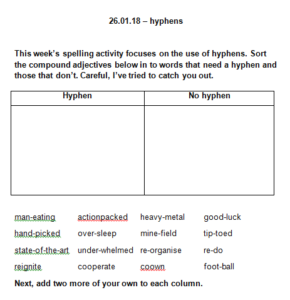27 April 2018
27.04.18
I before e is one of the most common spelling rules we hear. However, it doesn’t always work. In fact, “I before e, except after c when the sound is ee” is much more accurate – of course, there are exceptions to this rule: either, weird, their. This homework is designed to help children recognise which words follow the rule and which words don’t. Read the text below and underline all the ie words. Then, write your own short text that contains all of these words. You should return this completed activity on Thursday 3 May.
Brief Siege
Mrs Elizabeth Carver, niece of the Chief of Police, was besieged by wasps in her home yesterday. A ceiling fell down and knocked off an old mantelpiece. Hundreds of wasps flew out.
She shielded her face with a handkerchief and dialled 999. She gave a piercing shriek into the phone.
“Send the police. Believe me, these wasps will kill me if you don’t.”
The Chief of Police received the call and rushed to relieve her.
Friday 20 April 2018
This week, children have been learning about how Greek and Latin root words are embedded within the English Language. Understanding the meaning of a root word can help us to identify the meaning of unfamiliar words. For example, if we know that ‘auto’ means self and ‘graph’ means writing, we are able to understand the word ‘autograph’ – even if we’ve never come across it before! We’ve identified these words during our spelling sessions this week. Children should practise learning them in preparation for a test on Friday 27 April 2018. We’ll also focus a lot on what strategies we’ve used to learn them so evidence this in your homework book.
autobiography
photograph
autograph
telepathic
microphone
paragraph
television
telegraph
telephone
automatic
Friday 23 March 2018
| Homophones and near homophones
This week’s spellings are the same as last week. Because of other things happening in school, we haven’t practised these words as much as I would’ve liked. Because homophones are so important in our writing, I’d like children to be very confident with these words. Children should continue to learn these words in preparation for a test on Thursday 29 March. |
| break – brake |
| their – there – they’re |
| of – off |
| accept – except |
| meddle – medal |
| whose – who’s |
| where – wear – we’re |
| meat – meet |
| compliment – complement |
| practise – practice |
16 March 2018
| Homophones and near homophones
This week’s spellings are all homophones (words that sound the same but are spelt differently) and near-homophones (words that sound similar but are spelt differently and have different meanings). Some of them we have covered, some are new learning. Children should learn these words in preparation for a test on Friday 23 March. |
| break – brake |
| their – there – they’re |
| of – off |
| accept – except |
| meddle – medal |
| whose – who’s |
| where – wear – we’re |
| meat – meet |
| compliment – complement |
| practise – practice |
09 March 2018
| Suffixes
This week’s spellings are all words that contain suffixes. A suffix is added to a root word to change its meaning. Children often make spelling mistakes when adding suffixes to words. They should learn how to spell these words in preparation for a test on Friday 16 March. |
| thoughtful |
| enjoyable |
| ownership |
| equipment |
| courageously |
| silliest |
| altruism |
| excitement |
| frequently |
| purposeful |
23 February 2018
Apostrophes
Recently, in our writing, I’ve noticed that children are still making lots of errors with apostrophes. Apostrophes can be used in three ways:
- for contraction – we’re (instead of we are)
- for singular possession – Tim’s ball (the ball belongs to Tim)
- for plural possession – the dogs’ bed (the bed belongs to more than one dog)
This week, children have been given a worksheet to help them revise the use of apostrophes. They should be ready for a spelling test on Friday 02 February 2018.


02 February 2018
Revision
As it is the last week of this half-term, instead of being given a list of words to learn, you should revise all the rules we have focused on so far this year. You will be tested on these rules on Friday 09 February 2017.
Use the spelling page of your homework book to evidence your revision.
26 January 2018
This week, children have been given a spelling activity focussing on the use of hyphens. Hyphens are used to change the meaning of a chunk of text/to make it make sense. For example, a man-eating shark is much more dangerous than a man eating shark (a man eating a shark).
Children should complete the activity for Thursday 01 February.

19 January 2018
This week our homework is Creative: I can find out about a plant I like.
This links well with our Life Forces topic and our class novel. In class, we discussed some ways in which you could respond creatively to this task:
- create a map of the world and highlight where your favourite flowers grow
- take pictures and create a slideshow with information
- make a model of your favourite plant
- complete an observational drawing of it
- make a presentation to inform the rest of the class
- create a word search of your favourite plant names
- make an information leaflet
- draw your favourite plant then label it with information
- take pictures of your plant in the wild and make a collage in your book
Homework is due on Thursday 25 January 2018.
19 January 2018
|
‘-ably’ or ‘-ibly’ words We’ve been focusing on learning how to spell words ending in ‘-ably’ or ‘-ibly’. Here’s a list of words that can be changed to end in ‘-ably’ or ‘-ibly’. Children should learn how to spell these words and be comfortable choosing and spelling the correct word ending. eg For the word possible, children will be asked to spell possibly in the test. |
| possible |
| sensible |
| reliable |
| incredible |
| respectable |
| agreeable |
| adorable |
| comfortable |
| preferable |
| visible |